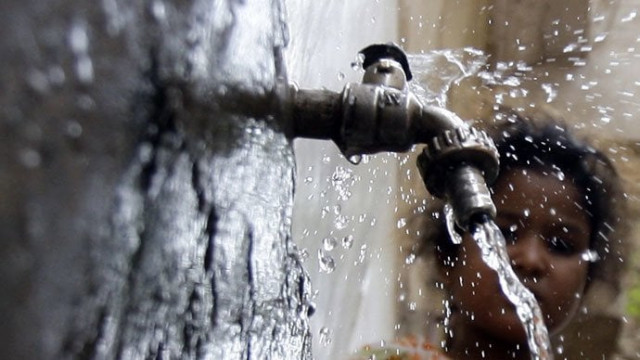Most Hyderabad's water samples unfit for human consumption: study
Alarming presence of antibiotic resistant bacteria detected in Hyderabad

Water samples deemed unfit for human consumption. PHOTO: REUTERS
DC Magsi orders PHE to ensure clean water supply
"... the presence of ARB is found in the groundwater, surface water and wastewater in Hyderabad and its surroundings," said USPCASW Deputy Director and principle investigator of the study Dr Rasool Bux Mahar. He identified the industrial waste, agricultural runoff and the waste of humans and animals as sources of the ARB.
"Bacterial isolates identified in the study's findings pose a potential threat to the people living in Hyderabad," he highlighted. According to Dr Mahar, the water distribution network in Hyderabad, being operated by the Water and Sanitation Agency, brimmed with technical flaws, deteriorating the water quality and also providing ripe conditions for the bacterial growth.
The Heterotrophic Plate Count, a method of measuring colony formation of bacteria in drinking water, found pseudomonas, shigella, vibrio and e-coli bacteria in the water samples. The ARBs reduce the efficacy of antibiotic medicines, making treatment of life-threatening illnesses difficult, if not impossible. Dr Mahar also illustrated the disinfection processes of ARB including the chlorine, ultraviolet and silver nano particles.
PCSIR senior scientific officer and co-investigator of study Dr Zulfiqar Ali Mirani informed that a total of 501 isolates of escherichia coli, pseudomonas aeruginosa, staphylococcus aureus, klebsiella pneumoniae, proteusp., shigella, vibrio and enterococci were identified in the study. The research, he added, screened them against commonly prescribed antibiotics.
"The microbiological analysis showed that the majority of water samples were not fit for human consumption," he concluded. Dr Mirani said that water used for drinking, cooking and washing should be free from coliform and fecal coliform bacteria.
The study, he told, found 70% of water samples, taken from the Water and Sanitation Agency's system, and 87% of river, canal and groundwater samples are unfit for drinking, cooking and washing purposes. "Majority of reverse osmosis (RO) plants' water samples were also not fit due to high bacterial load."
WASA cuts off 50 illegal water connections
Isra University Prof Dr Hussain Bux Kolachi, while sharing his research over typhoid, told the seminar that antibiotic resistant strains of Salmonella Typhi are showing a rapid increase. "We are running out of the treatment options, which makes [preventive] vaccination against typhoid even more imperative," he underscored.
"Typhoid infection prevention is more crucial than treatment," he added. He cited World Health Organization's figures according to which up to 33 million cases typhoid resistant cases are reported globally, claiming between 500,000 to 600,000 lives due to typhoid fever annually.
University of Utah, USA, Prof Dr Jeff Ulman said that the revealed study paved the way for the global health networks to tackle such health issues. He suggested that lifestyle changes are indispensable as a preventive measure.
The seminar recommended that the communities, government and relevant authorities should be sensitised about the health issues through awareness campaigns. The people should be discouraged from self-medication and excessive use of antibiotics. It also suggested disposal of hospital waste and treatment of wastewater before it is released in the fresh waterways. The recommendations also emphasised on removing the technical flaws in the water distribution network.
Published in The Express Tribune, October 14th, 2018.



















COMMENTS
Comments are moderated and generally will be posted if they are on-topic and not abusive.
For more information, please see our Comments FAQ